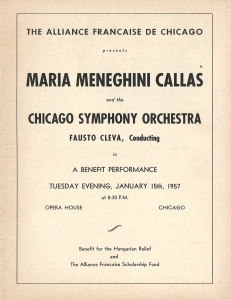
Maria Callas was scheduled to appear with the Chicago Symphony Orchestra at the Civic Opera House on January 15, 1957, in a benefit concert sponsored by the Alliance Française de Chicago for Hungarian relief following the recent Soviet invasion. Karl Böhm was to conduct, and the program would include several opera arias and a few orchestral selections.
However, as reported extensively in the press, there were several disputes between Callas and Böhm, and they were unable to come to an agreement regarding the program. Four days before the concert, it was announced that Böhm had withdrawn, having “reached a stalemate in program arrangements with the soprano.” Fausto Cleva, a house conductor at the Metropolitan Opera, was quickly engaged as his replacement; Callas arrived in Chicago three days before the concert, but by some accounts was more than two hours late for the first rehearsal.
The concert was notable for a variety of reasons. “Returning to the still reverberating scene of her American opera debut [in the title role of Bellini’s Norma in November 1954] to sing her first American concert on that same Civic Opera House stage, she knew the audience was wondering what really had happened to that stratospheric voice, of late winning headlines for the wrong reasons,” wrote Claudia Cassidy in the Chicago Tribune. “So she took that voice, rammed it down their throats, and looked justifiably triumphant when they cheered.”
Cleva and the Orchestra began the concert with Rossini’s Overture to Semiramide, and Callas performed arias from Bellini’s Norma and La sonnambula, Donizetti’s Lucia di Lammermoor, Meyerbeer’s Dinorah, and Verdi’s Il trovatore (not all of the program is confirmed, as there are discrepancies between the program book and newspaper accounts). Near the end of the first half of the program, “Callas showed her mettle. She put down her bouquet, rested a foot on the podium, folded her arms, and sang ‘In questa reggia’ from Puccini’s Turandot, [which] as all operagoers know, is plain dynamite,” continued Cassidy. “It meant that a superb singer who is also an artist, and so doubly valuable, sang that cold, cruelly beautiful aria with every ounce of strength she could summon, driving it like nails into the consciousness of the audience. It was not beautiful, for it was forced to a degree altogether perilous to the human voice so mistreated. But it was, for sheer courage and determination, for winning at all costs, magnificent.”
Image above: Maria Callas (Angus McBean photo)
This article also appears here.
